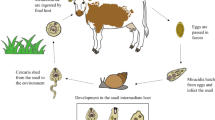Abstract
The objective of the present study was to determine the seroprevalence of Fasciola hepatica infection in horses, donkeys and mules from different climate regions in two states of Mexico. A total of 594 serum samples were analysed for immunoglobulin G (IgG) antibodies using enzyme-linked immunosorbent assay (ELISA), with excretory-secretory (E/S) products as the antigen. The diagnostic sensitivity and specificity of serum IgG ELISA were 100% and 97.2%, respectively. We collected data using a questionnaire. The overall prevalence of the parasite in equids between May 2018 and April 2019 was 13.1% (78 out of 594). The highest prevalence was found in mules (17.9%), followed by that in donkeys (13.9%) and horses (10.4%). In addition, the highest percentage of positive equines was detected in samples from the tropical climate (17.5%). The identification of risk factors was assessed by bivariate logistic regression analysis. Mules had 8.608 times higher risk for F. hepatica infections as compared with horses (odds ratio (OR) 8.608; 95% confidence interval (CI): 2.809–26.377), while the OR for 6–10-year-old equines was 93.375 compared with that of young equines (≤ 5 years old) (OR 93.375; 95% CI: 11.075–787.239). Likewise, tropical climate equines had 83.7% increased odds for fasciolosis (OR 1.83).
Similar content being viewed by others
References
Acici M, Bolukbas CS, Gurler AT, Umur S, Buyuktanir O (2013) Seroprevalence of fasciolosis in equines of the Black Sea Region, Turkey. J. Equine Vet. Sci 33(1):62–66. https://doi.org/10.1016/j.jevs.2012.04.015
Alvarez Rojas CA, Jex AR, Gasser RB, Scheerlinck JP (2014) Techniques for the diagnosis of Fasciola infections in animals: room for improvement. Adv Parasitol 85:65–107. https://doi.org/10.1016/B978-0-12-800182-0.00002-7
Andrews S, Graczyk T, Fried B, Fairweather I, Threadgold L, Torgerson P (1999) Fasciolosis the life cycle of Fasciola hepatica. CAB International Oxon, Wallingford, pp 1–29
Arias MS, Piñeiro P, Hillyer GV, Francisco I, Cazapal-Monteiro CF, Suárez JL, Morrondo P, Sánchez-Andrade R, Paz-Silva A (2012) Enzyme-linked immunosorbent assays for the detection of equine antibodies specific to a recombinant Fasciola hepatica surface antigen in an endemic area. Parasitol Res 110(2):1001–1007. https://doi.org/10.1007/s00436-011-2587-x
Cwiklinski K, O'Neill SM, Donnelly S, Dalton JP (2016) A prospective view of animal and human fasciolosis. Parasite Immunol 38(9):558–568. https://doi.org/10.1111/pim.12343
Fletcher R, Fletcher S, Fletcher G (2012) Clinical epidemiology: the essentials. Fifth. Lippincott Williams & Wilkins
Getachew M, Innocent GT, Trawford AF, Reid SW, Love S (2010) Epidemiological features of fasciolosis in working donkeys in Ethiopia. Vet Parasitol 169(3–4):335–339. https://doi.org/10.1016/j.vetpar.2010.01.007
Hinney B, Wirtherle NC, Kyule M, Miethe N, Zessin KH, Clausen PH (2011) Prevalence of helminths in horses in the state of Brandenburg, Germany. Parasitol Res 108(5):1083–1091. https://doi.org/10.1007/s00436-011-2362-z
Howell AK, Malalana F, Beesley NJ, Hodgkinson JE, Rhodes H, Sekiya M, Archer D, Clough HE, Gilmore P, Williams DJL (2019) Fasciola hepatica in UK horses. Equine Vet J 52:194–199. https://doi.org/10.1111/evj.13149
Mehmood K, Zhang H, Sabir AJ, Abbas RZ, Ijaz M, Durrani AZ, Saleem MH, Ur Rehman M, Iqbal MK, Wang Y, Ahmad HI, Abbas T, Hussain R, Ghori MT, Ali S, Khan AU, Li J (2017) A review on epidemiology, global prevalence and economical losses of fasciolosis in ruminants. Microb Pathog 109:253–262. https://doi.org/10.1016/j.micpath.2017.06.006
Quigley A, Sekiya M, Egan S, Wolfe A, Negredo C, Mulcahy G (2017) Prevalence of liver fluke infection in Irish horses and assessment of a serological test for diagnosis of equine fasciolosis. Equine Vet J 49(2):183–188. https://doi.org/10.1111/evj.12577
Quigley A, Sekiya M, Garcia-Campos A, Paz-Silva A, Howell A, Williams DJL, Mulcahy G (2020) Horses are susceptible to natural, but resistant to experimental, infection with the liver fluke, Fasciola hepatica. Vet Parasitol 281:109094. https://doi.org/10.1016/j.vetpar.2020.109094
Sanchis J et al (2016) Determination of exposure to Fasciola hepatica in horses from Uruguay using a recombinant-based ELISA. Vet Med 60(9):483–488. https://doi.org/10.17221/8439-vetmed
Torgerson P, Claxton J (1999) Epidemiology and control. Fasciolosis 113:149
Umur Ş, Acici M (2009) A survey on helminth infections of equines in the Central Black Sea region, Turkey. Turk J Vet Anim Sci 33(5):373–378
Villa-Mancera A, Reynoso-Palomar A (2018) Bulk tank milk ELISA to detect IgG1 prevalence and clustering to determine spatial distribution and risk factors of Fasciola hepatica-infected herds in Mexico. J Helminthol:1–7
Villa-Mancera A, Reynoso-Palomar A (2019) High prevalence, potential economic impact, and risk factors of Fasciola hepatica in dairy herds in tropical, dry and temperate climate regions in Mexico. Acta Trop 193:169–175. https://doi.org/10.1016/j.actatropica.2019.03.005
Villa-Mancera A, Reynoso-Palomar A, Olivares-Perez J, Ortega-Vargas S, Cruz-Mendoza I, Quiroz-Romero H (2015) Motility of Fasciola hepatica miracidia assessed with a computer-assisted sperm analyser. J Helminthol 89(4):453–457. https://doi.org/10.1017/S0022149X14000285
Villa-Mancera A, Molina-Mendoza P, Hernandez-Guzman K, Olivares-Perez J, Sarracent-Perez J, Zumaquero-Rios J (2016) Comparative diagnosis of serum IgG1 and coproantigen ELISA for fasciolosis detection of goats in Mexico. Biomed Res Int 2016:3860928–3860927. https://doi.org/10.1155/2016/3860928
Williams DJL, Hodgkinson JE (2017) Fasciolosis in horses: a neglected, re-emerging disease. Equine Vet. Educ 29(4):202–204. https://doi.org/10.1111/eve.12521
Funding
This study was supported by Benemérita Universidad Autónoma de Puebla (VIEP-VIMA-NAT-18-I).
Author information
Authors and Affiliations
Corresponding author
Ethics declarations
This study was approved by the local Animal Care and Ethics Committee of the Meritorious Autonomous University of Puebla, and all procedures complied with National Legislation Pertaining to Animal Health Research.
Conflict of interest
The authors declare that they have no conflicts of interest.
Additional information
Section Editor: Abdul Jabbar
Publisher’s note
Springer Nature remains neutral with regard to jurisdictional claims in published maps and institutional affiliations.
Rights and permissions
About this article
Cite this article
Villa-Mancera, A., Reynoso-Palomar, A. The prevalence and risk factors of liver fluke infection in Mexican horses, donkeys and mules in tropical and temperate regions. Parasitol Res 119, 3699–3703 (2020). https://doi.org/10.1007/s00436-020-06910-1
Received:
Accepted:
Published:
Issue Date:
DOI: https://doi.org/10.1007/s00436-020-06910-1




